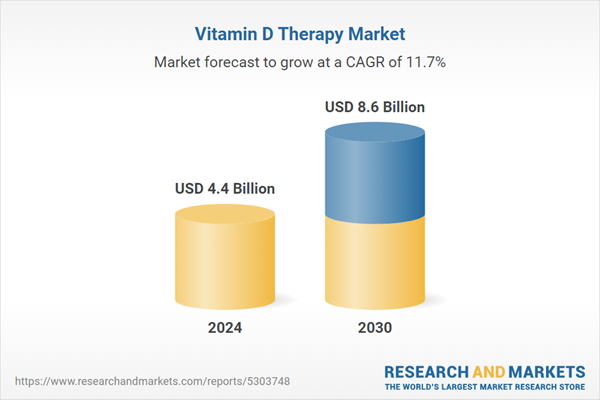Global Vitamin D Therapy Market - Key Trends & Drivers Summarized
What Is Vitamin D Therapy, and Why Is It So Crucial in Modern Healthcare?
Vitamin D Therapy refers to the medical use of vitamin D supplements or medications to prevent or treat vitamin D deficiency and related health conditions. Vitamin D is a vital nutrient that plays a critical role in calcium absorption, bone health, immune function, and the prevention of various diseases, including osteoporosis, rickets, cardiovascular diseases, and autoimmune disorders. Vitamin D therapy can involve over-the-counter supplements, prescription-grade vitamin D (like vitamin D2 or D3), or high-dose injections, and it is commonly prescribed for individuals with low vitamin D levels, those at risk of deficiency, or patients with specific conditions like chronic kidney disease, osteoporosis, or malabsorption syndromes.The importance of vitamin D therapy lies in its ability to address widespread vitamin D deficiency, which affects millions globally and can lead to weakened bones, increased risk of fractures, impaired immune function, and other health issues. Given its essential role in bone health, immune support, and inflammation control, vitamin D therapy is crucial in managing conditions like osteoporosis, reducing the risk of falls in the elderly, and supporting overall health. As research continues to reveal broader benefits of vitamin D, such as its potential role in reducing the severity of respiratory infections and supporting mental well-being, vitamin D therapy has become a cornerstone of both preventive and therapeutic healthcare strategies.
How Are Technological Advancements Shaping the Vitamin D Therapy Market?
Technological advancements have significantly enhanced the effectiveness, precision, and accessibility of Vitamin D Therapy, driving innovation across healthcare sectors. One of the major developments is the rise of more bioavailable formulations, such as liposomal vitamin D, nanoemulsions, and sublingual sprays, which improve absorption rates and increase the effectiveness of supplementation. These advanced delivery systems enhance the bioavailability of vitamin D, allowing it to be absorbed directly into the bloodstream, bypassing the digestive system and reducing variability in absorption. This is particularly beneficial for patients with malabsorption disorders or those requiring rapid correction of deficiency.Advancements in diagnostic testing for vitamin D levels have also played a critical role in shaping the market. High-precision testing methods, including advanced immunoassays and mass spectrometry, provide accurate measurements of serum 25-hydroxyvitamin D levels, allowing healthcare providers to tailor therapy to individual needs. Rapid point-of-care testing has made it easier for clinicians to screen for deficiencies and adjust vitamin D dosages more effectively, supporting personalized treatment plans. Digital health technologies, such as mobile apps and wearable devices, now offer features for tracking vitamin D intake, sun exposure, and overall health outcomes, enabling patients to monitor their therapy and compliance more effectively.
The integration of vitamin D therapy with telemedicine has further expanded access, especially in remote or underserved areas. Telehealth platforms enable healthcare providers to diagnose deficiencies, prescribe supplements, and monitor patient progress through virtual consultations, making vitamin D therapy more accessible to a broader population. Additionally, AI-driven health analytics are being used to predict vitamin D deficiencies based on patient demographics, dietary habits, geographic location, and lifestyle factors, supporting proactive intervention and more targeted therapy. These technological innovations not only expand the capabilities of vitamin D therapy but also align with broader trends toward personalized medicine, digital healthcare, and preventive care in modern healthcare systems.
What Are the Emerging Applications of Vitamin D Therapy Across Different Health Conditions?
Vitamin D Therapy is finding expanding applications across a variety of health conditions, driven by its essential role in supporting bone health, immune function, and overall well-being. In osteoporosis and bone health management, vitamin D therapy is a standard treatment used to improve calcium absorption, enhance bone mineral density, and reduce the risk of fractures, particularly in the elderly and postmenopausal women. It is often used in combination with calcium supplements and medications like bisphosphonates to optimize bone health and prevent osteopenia from progressing to osteoporosis.In immune health, vitamin D therapy is recognized for its potential to enhance immune responses and reduce the risk of infections. Studies have shown that adequate vitamin D levels can help lower the risk of respiratory infections, including the flu and other viral illnesses. During the COVID-19 pandemic, there was significant interest in the potential role of vitamin D in reducing disease severity and supporting immune resilience, prompting increased use of vitamin D supplements as part of immune-boosting regimens.
In chronic conditions like diabetes, cardiovascular disease, and autoimmune disorders, vitamin D therapy is used to support overall health and manage disease progression. Research indicates that vitamin D deficiency is associated with increased risks of insulin resistance, hypertension, and autoimmune diseases like multiple sclerosis. For patients with chronic kidney disease (CKD), vitamin D therapy helps manage mineral and bone disorders, addressing secondary hyperparathyroidism and preventing complications like renal osteodystrophy. In mental health, vitamin D therapy has shown promise in alleviating symptoms of depression, supporting cognitive function, and reducing the risk of dementia in older adults. The expanding applications of vitamin D therapy across these diverse health conditions highlight its critical role in preventive healthcare, chronic disease management, and immune support.
What Drives Growth in the Vitamin D Therapy Market?
The growth in the Vitamin D Therapy market is driven by several factors, including increasing awareness of vitamin D deficiency, rising prevalence of osteoporosis and chronic diseases, and growing research into the broader health benefits of vitamin D. One of the primary growth drivers is the high global prevalence of vitamin D deficiency, which affects people across all age groups, geographic locations, and socioeconomic statuses. This widespread deficiency has led to increased screening efforts, preventive supplementation, and therapeutic interventions, driving demand for both over-the-counter and prescription-grade vitamin D products.The rising prevalence of osteoporosis, particularly among the aging population, has further fueled demand for vitamin D therapy. As the global elderly population continues to grow, the need for effective bone health management strategies, including vitamin D supplementation, has become more urgent. Public health initiatives promoting bone health awareness and encouraging routine vitamin D intake have also contributed to market growth. The integration of vitamin D therapy into standard treatment protocols for osteoporosis, osteopenia, and fracture prevention has made it a central component of geriatric healthcare.
Advancements in research have revealed additional health benefits of vitamin D, such as its potential to support immune function, reduce inflammation, and lower the risk of certain cancers and autoimmune diseases. This expanding body of evidence has increased consumer interest in vitamin D as a preventive health supplement, boosting demand in both healthcare and retail channels. The growing trend toward personalized nutrition has also contributed to market growth, with tailored vitamin D supplements designed for specific demographics, such as infants, pregnant women, athletes, and the elderly, further driving demand.
With ongoing innovations in bioavailable formulations, personalized treatment approaches, and digital health integration, the vitamin D therapy market is poised for robust growth. These trends, combined with increasing public awareness, preventive health initiatives, and rising healthcare spending, make vitamin D therapy a vital component of modern healthcare strategies focused on improving overall health outcomes across diverse populations.
Report Scope
The report analyzes the Vitamin D Therapy market, presented in terms of market value (US$ Thousand). The analysis covers the key segments and geographic regions outlined below.- Segments: Route of Administration (Oral, Parenteral); Method (Prescription Drugs, OTC Drugs); Application (Osteoporosis, Rickets, Muscle Weakness, Autoimmune Disorders, Skin Diseases, Other Applications).
- Geographic Regions/Countries:World; United States; Canada; Japan; China; Europe (France; Germany; Italy; United Kingdom; and Rest of Europe); Asia-Pacific; Rest of World.
Key Insights:
- Market Growth: Understand the significant growth trajectory of the Oral Administration segment, which is expected to reach US$5.9 Billion by 2030 with a CAGR of a 12%. The Parenteral Administration segment is also set to grow at 10.9% CAGR over the analysis period.
- Regional Analysis: Gain insights into the U.S. market, valued at $1.2 Billion in 2024, and China, forecasted to grow at an impressive 10.9% CAGR to reach $1.3 Billion by 2030. Discover growth trends in other key regions, including Japan, Canada, Germany, and the Asia-Pacific.
Why You Should Buy This Report:
- Detailed Market Analysis: Access a thorough analysis of the Global Vitamin D Therapy Market, covering all major geographic regions and market segments.
- Competitive Insights: Get an overview of the competitive landscape, including the market presence of major players across different geographies.
- Future Trends and Drivers: Understand the key trends and drivers shaping the future of the Global Vitamin D Therapy Market.
- Actionable Insights: Benefit from actionable insights that can help you identify new revenue opportunities and make strategic business decisions.
Key Questions Answered:
- How is the Global Vitamin D Therapy Market expected to evolve by 2030?
- What are the main drivers and restraints affecting the market?
- Which market segments will grow the most over the forecast period?
- How will market shares for different regions and segments change by 2030?
- Who are the leading players in the market, and what are their prospects?
Report Features:
- Comprehensive Market Data: Independent analysis of annual sales and market forecasts in US$ Million from 2024 to 2030.
- In-Depth Regional Analysis: Detailed insights into key markets, including the U.S., China, Japan, Canada, Europe, Asia-Pacific, Latin America, Middle East, and Africa.
- Company Profiles: Coverage of players such as Abbott, Alkem Laboratories Ltd., Cadila Healthcare Ltd., GlaxoSmithKline PLC, Merck & Co., Inc. and more.
- Complimentary Updates: Receive free report updates for one year to keep you informed of the latest market developments.
Some of the 36 companies featured in this Vitamin D Therapy market report include:
- Abbott
- Alkem Laboratories Ltd.
- Cadila Healthcare Ltd.
- GlaxoSmithKline PLC
- Merck & Co., Inc.
- Novartis AG
- Pfizer Inc
- Sanofi
- Sun Pharmaceutical Industries Ltd.
- Torrent Pharmaceuticals Ltd.
This edition integrates the latest global trade and economic shifts into comprehensive market analysis. Key updates include:
- Tariff and Trade Impact: Insights into global tariff negotiations across 180+ countries, with analysis of supply chain turbulence, sourcing disruptions, and geographic realignment. Special focus on 2025 as a pivotal year for trade tensions, including updated perspectives on the Trump-era tariffs.
- Adjusted Forecasts and Analytics: Revised global and regional market forecasts through 2030, incorporating tariff effects, economic uncertainty, and structural changes in globalization. Includes historical analysis from 2015 to 2023.
- Strategic Market Dynamics: Evaluation of revised market prospects, regional outlooks, and key economic indicators such as population and urbanization trends.
- Innovation & Technology Trends: Latest developments in product and process innovation, emerging technologies, and key industry drivers shaping the competitive landscape.
- Competitive Intelligence: Updated global market share estimates for 2025, competitive positioning of major players (Strong/Active/Niche/Trivial), and refined focus on leading global brands and core players.
- Expert Insight & Commentary: Strategic analysis from economists, trade experts, and domain specialists to contextualize market shifts and identify emerging opportunities.
Table of Contents
Companies Mentioned (Partial List)
A selection of companies mentioned in this report includes, but is not limited to:
- Abbott
- Alkem Laboratories Ltd.
- Cadila Healthcare Ltd.
- GlaxoSmithKline PLC
- Merck & Co., Inc.
- Novartis AG
- Pfizer Inc
- Sanofi
- Sun Pharmaceutical Industries Ltd.
- Torrent Pharmaceuticals Ltd.
Table Information
| Report Attribute | Details |
|---|---|
| No. of Pages | 222 |
| Published | February 2026 |
| Forecast Period | 2024 - 2030 |
| Estimated Market Value ( USD | $ 4.4 Billion |
| Forecasted Market Value ( USD | $ 8.6 Billion |
| Compound Annual Growth Rate | 11.7% |
| Regions Covered | Global |









